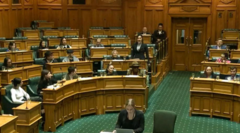In a controversial move, New Zealand's parliament has suspended three Māori MPs for their haka performance during a sitting last year, prompting an outcry over the treatment of indigenous voices in the political arena.
Opposition MP Hana-Rawhiti Maipi-Clarke initiated the haka—an indigenous dance signifying defiance—after being queried about her party, Te Pāti Māori (Māori Party), and their stance on a contentious bill aimed at redefining New Zealand's foundational treaty. Maipi-Clarke has received a seven-day suspension, while the party's leaders, Rawiri Waititi and Debbie Ngarewa-Packer, face 21-day bans.
The bill at the heart of this protest sought to alter interpretations of the Treaty of Waitangi, an agreement between the British Crown and Māori chiefs dating back to 1840. Although the bill was ultimately rejected with a resounding 112 votes against, the event has spotlighted the deteriorating relationship between the Māori community and the conservative government, particularly amidst increasing calls for bolstered indigenous rights.
The viral haka performance last November captured international attention as it highlighted the MPs’ fervent opposition to the bill. A parliamentary committee noted that the act may have intimidated other legislators, leading to the unprecedented suspensions—which exceeded the previous record ban of three days for any lawmaker in New Zealand's history.
Amid the parliamentary debate surrounding the penalties, Maipi-Clarke delivered an impassioned speech asserting, "We will never be silenced, and we will never be lost." She questioned, "Are our voices too loud for this house – is that why we are being punished?"
The debate took a heated turn when New Zealand's Foreign Minister Winston Peters controversially labeled Te Pāti Māori a "bunch of extremists," further igniting tensions within parliament. Currently, the Māori party occupies six of the 123 seats in parliament, a minority that continues to fight for greater representation and rights.
The backlash against the proposed Treaty Principles Bill and the subsequent protests—which gathered over 40,000 participants—reflect deep-seated concerns among Māori activists over perceived governmental overreach and the potential estrangement of Māori rights in the political sphere as the country grapples with its colonial history.
Opposition MP Hana-Rawhiti Maipi-Clarke initiated the haka—an indigenous dance signifying defiance—after being queried about her party, Te Pāti Māori (Māori Party), and their stance on a contentious bill aimed at redefining New Zealand's foundational treaty. Maipi-Clarke has received a seven-day suspension, while the party's leaders, Rawiri Waititi and Debbie Ngarewa-Packer, face 21-day bans.
The bill at the heart of this protest sought to alter interpretations of the Treaty of Waitangi, an agreement between the British Crown and Māori chiefs dating back to 1840. Although the bill was ultimately rejected with a resounding 112 votes against, the event has spotlighted the deteriorating relationship between the Māori community and the conservative government, particularly amidst increasing calls for bolstered indigenous rights.
The viral haka performance last November captured international attention as it highlighted the MPs’ fervent opposition to the bill. A parliamentary committee noted that the act may have intimidated other legislators, leading to the unprecedented suspensions—which exceeded the previous record ban of three days for any lawmaker in New Zealand's history.
Amid the parliamentary debate surrounding the penalties, Maipi-Clarke delivered an impassioned speech asserting, "We will never be silenced, and we will never be lost." She questioned, "Are our voices too loud for this house – is that why we are being punished?"
The debate took a heated turn when New Zealand's Foreign Minister Winston Peters controversially labeled Te Pāti Māori a "bunch of extremists," further igniting tensions within parliament. Currently, the Māori party occupies six of the 123 seats in parliament, a minority that continues to fight for greater representation and rights.
The backlash against the proposed Treaty Principles Bill and the subsequent protests—which gathered over 40,000 participants—reflect deep-seated concerns among Māori activists over perceived governmental overreach and the potential estrangement of Māori rights in the political sphere as the country grapples with its colonial history.




















